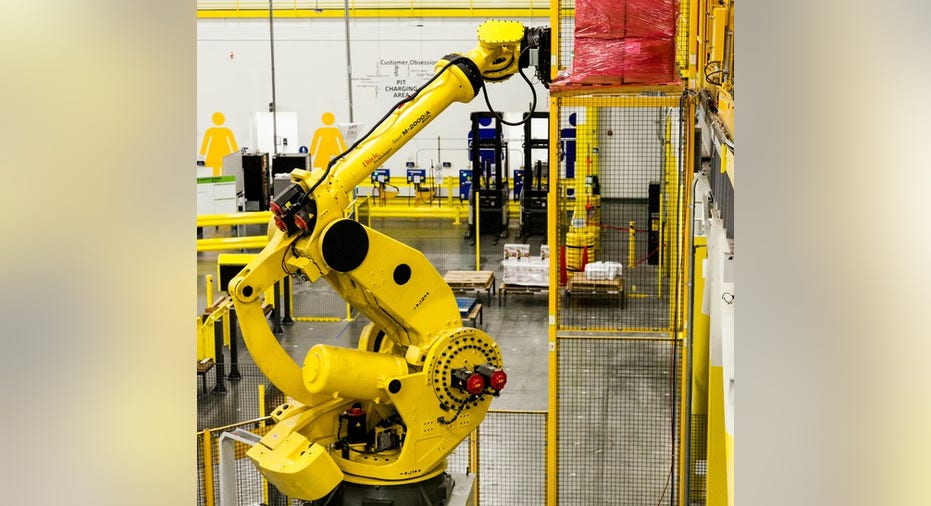Here's What Amazon Actually Plans for Physical Stores

As Amazon (NASDAQ: AMZN) has dipped its toes into the water of building physical retail locations, rumors of its eventual plans have included all sorts of things that the company has not actually done. When a retail chain struggles, there are speculative stories about the online retailer buying it. In addition, there have been stories like a recent one in The New York Post that claimed Amazon had plans for an automated, two-story grocery store that required as few as three workers to operate.
Amazon CEO Jeff Bezos took to Twitter to vehemently deny that any such plan existed. He tweeted in part "whoever your anonymous sources are on this story ... they've mixed up their meds!" The CEO followed that up with another tweet rebutting the idea that his company had figured out how to use robot-run stores to dramatically improve typical grocery store margins: "... if anybody knows how to get 20% margins in groceries, call me! :)"
It was a very strong denial by Bezos, but just because this story is not true (or at least the company claims it isn't) does not mean Amazon does not have brick-and-mortar plans. The retailer does, and CFOBrian Olsavsky laid them out during the company's Q4 earnings call on Feb. 2, which was transcribed by Seeking Alpha (registration required).
Amazon may not be prepping robot-run stores, but it does use them in its warehouses. Image source: Amazon.
What are Amazon's retail plans?
While the media and the public seem to expect Amazon to make a grand entrance into physical retail, its near-term plans remain modest. The company currently has one Amazon Go store -- a convenience store with automated checkout -- and while Olsavsky called the Seattle store "very interesting," he also noted "it's only one store at this time." He called the single store a "beta" and acknowledged that "we like the promise of that," but stopped short of announcing plans for expansion.
The CFO did say to expect more brick-and-mortar Amazon bookstore locations. Even there, though, the company's plans remain modest. "We have three physical stores; Seattle, San Diego, and Portland right now. We see adding five more this year," he said. "So we're still in that phase where we're testing and learning and getting better, even on the bookstore."
Olsavsky also acknowledged that Amazon has tested pop-up stores, where you can learn about and buy Amazon devices and services,and "college pickup points," where online orders can be picked up. He implied that there would be expansion of the campus format saying it "creates a great value," but did not commit to adding a specific amount. The CFO did not entirely shut down the idea of launching other formats, but he made it clear that experiments would continue.
"So not much projection beyond where we are today except for the fact that we will be adding more bookstores," he said. "But we test, we innovate, we think the bookstores for instance are a really great way for customers to engage with our devices and see them, touch them, play with them and become fans. So we see a lot of value in that as well."
Amazon is taking it slow
It's easy to see why Amazon customers would love the company to put stores around the country. On the other hand, it's also easy to see why the online retailer has taken it very slowly. Amazon's chief advantage has long been that it does not have the overhead associated with traditional physical retailers. Adding stores means adding expense and that's something the company has correctly been very cautious about.
There may someday be thousands of Amazon bookstores, convenience stores, and maybe even robot-run grocery stores. That day, however, is not imminent. The online retailer is still testing the waters and while it's growing its physical portfolio, it's doing so slowly, which seems to be how it will proceed for the immediate future.
Find out why Amazon is one of the 10 best stocks to buy now
Motley Fool co-founders Tom and David Gardner have spent more than a decade beating the market. (In fact, the newsletter they run, Motley Fool Stock Advisor, has tripled the market!*)
Tom and David just revealed their ten top stock picks for investors to buy right now. Amazon is on the list -- but there are nine others you may be overlooking.
Click here to get access to the full list!
*Stock Advisor returns as of February 6, 2017
Daniel Kline has no position in any stocks mentioned. The Motley Fool owns shares of and recommends Amazon and Twitter. The Motley Fool has a disclosure policy.



















